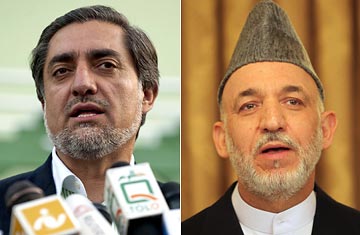
Afghan presidential candidates Abdullah Abdullah, left and Hamid Karzai, right.
It may be days before the results are known, but it's already clear that whomever emerges victorious from Afghanistan's election will face a legitimacy problem. Both incumbent President Hamid Karzai and his lead rival, Abdullah Abdullah, claimed Friday to have won a majority in the first round, and Abdullah filed complaints accusing the Karzai camp of rigging the vote. None of this is surprising, of course; allegations of vote-rigging had emerged even before voting day. Abdullah said Thursday that he would abide by the result despite his complaints — although a tight election outcome might change his calculations.
The danger of an Iran-type contested election outcome is not the only legitimacy problem facing the next government. Early indications are that less than 50% of registered voters showed up at the polls amid widespread fear of violence by the resurgent Taliban, which had warned it would attack voting booths. Sporadic violence occurred on election day, but the specter of retribution from an insurgent force that is able to operate in as much as half of the country clearly had a dampening effect on turnout. Should the result that emerges in the coming days give no candidate a clear majority and force the top two contenders, expected to be Karzai and Abdullah, into a runoff race, political tensions are likely to escalate sharply.
However, an inconclusive poll that fails to clearly legitimize the next government may not be a setback for the Obama Administration's Afghanistan strategy. On the contrary, it could offer an important opportunity to remake a system of government so dysfunctional that it has enabled a massive Taliban resurgence.
When a broken bone heals badly, it often leaves doctors no option but to re-break and reset the limb in order to allow the bone to properly do its job. Long before Thursday's election, U.S. officials had identified the Afghan political system — not simply the Karzai government, but the very manner in which the Afghan system created after the U.S. invasion is organized, and allocates power and resources — as an obstacle to the goal of defeating the Taliban. The key to the U.S. counterinsurgency strategy is to create security and development at the local level, establishing a system of governance that Afghans believe is worth fighting for. Plainly, nothing like that has happened on Karzai's watch, and few had much confidence that a change of personality in the presidential palace would be enough to change the dynamic.
U.S. advisers had made clear that regardless of who won the election, Washington planned to use the leverage derived from the dependency of any Afghan on Western military and financial support to reorganize the way the country is governed — strengthening the capability of ministries to deliver services to the citizenry; eliminating corruption and cronyism; and reallocating power and resources away from the central government and towards provincial and local level administrators capable of promoting development and winning the hearts and minds of the population. Assuming that Karzai would likely emerge as the winner, there had been talk of persuading him to accept Ashraf Gani, one of his key challengers, in a kind of chief executive or prime minister-type role to run the government. Gani is a favorite with the West for the competence he displayed during his tenure as Afghanistan's finance minister. It had also been suggested that the U.S. would encourage Karzai to draw his most popular rival candidates into a national unity government.
The last thing the U.S. counterinsurgency effort needs is for Karzai to be returned on a winner-takes-all basis, owing countless political favors to local level warlords whose interests run counter to good governance — and using a popular mandate as a basis to resist U.S. efforts to weed out corruption and cronyism. An election outcome that puts a question-mark over the legitimacy of the next president could, paradoxically, actually suit the U.S. purpose. That's because Afghanistan's current system of government, in U.S. thinking, requires the proverbial re-break and reset in order to create a regime sufficiently responsive and accountable to its own citizenry to give the counterinsurgency campaign a better chance of defeating the Taliban.
